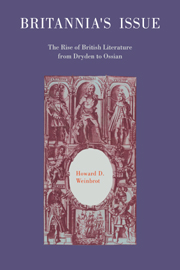Book contents
- Frontmatter
- Contents
- Acknowledgments and editorial notes
- INTRODUCTION: An overview of scope and method
- PART I CONTEXTS: INTELLECTUAL, PSYCHOLOGICAL, AND NATIONAL
- PART II TEXTS WITHIN CONTEXTS. ESSAYING ENGLAND: OUR GENIUS, OUR CLIME
- PART III GROWING ONE'S OWN. THE BRITISH ODE FROM COWLEY TO GRAY
- PART IV EXPANDING THE BORDERS. JEWS AND JESUS: THIS ISRAEL, THIS ENGLAND
- Prologue to Part IV
- 11 THE HOUSE OF DAVID AND THE HOUSE OF ST. GEORGE: PHILOSEMITISM, HEBREWS, AND HANDEL
- 12 BEYOND THE HEBREW LEAVEN: SMART AND THE GOD IN CHRIST
- PART V CELTS, GERMANS, AND SCOTS: TOWARDS A UNITED KINGDOM
- APPENDIX: The text of Handel's “Israel in Egypt”
- Index
Prologue to Part IV
Published online by Cambridge University Press: 15 December 2009
- Frontmatter
- Contents
- Acknowledgments and editorial notes
- INTRODUCTION: An overview of scope and method
- PART I CONTEXTS: INTELLECTUAL, PSYCHOLOGICAL, AND NATIONAL
- PART II TEXTS WITHIN CONTEXTS. ESSAYING ENGLAND: OUR GENIUS, OUR CLIME
- PART III GROWING ONE'S OWN. THE BRITISH ODE FROM COWLEY TO GRAY
- PART IV EXPANDING THE BORDERS. JEWS AND JESUS: THIS ISRAEL, THIS ENGLAND
- Prologue to Part IV
- 11 THE HOUSE OF DAVID AND THE HOUSE OF ST. GEORGE: PHILOSEMITISM, HEBREWS, AND HANDEL
- 12 BEYOND THE HEBREW LEAVEN: SMART AND THE GOD IN CHRIST
- PART V CELTS, GERMANS, AND SCOTS: TOWARDS A UNITED KINGDOM
- APPENDIX: The text of Handel's “Israel in Egypt”
- Index
Summary
I have objected to literary history whose preconceptions deny readers the complexity and diversity of eighteenth-century British cultures. One further consequence of biases like “Augustan humanism” is their inability to see urgent nonclassical contexts – like the flowering of Britain's Hebraic seed.
This is made possible in several ways. There was deep respect for a religion whose ancient acceptance of monotheism and whose paternity of Jesus of course were basic to any Christian vision. Many commentators regarded each half of their Judeo-Christian heritage as essential, especially since divinely inspired Jews were widely regarded as instructors of the Greeks, Romans and, as we shall see, even the Celtic Druids. The Hebrew language often was thought cognate with English, and its aid to metaphorical and imaginative vigor thought impossible for French. With God's help Hebrew, most often read in the translated King James' version, embodied literature that surpassed the classical south's literature in quality, sublimity, and moral content. Exodus, Job, the Song of Solomon, and the Psalms of David were among those divine texts cited as superior to classical foolishness and savagery.
The small number of Jewish merchants permitted in Cromwell's England served specific domestic functions as well. Devout Christians loved their Jewish brethren in order to convert them, bring the Second Coming closer, and gain God's credit for such holy work. The religion to which they would convert naturally was some version of English Protestantism, for the Jews were victimized in the English Catholic past, and wisely were more sympathetic to the Church of England than to the Church of Rome.
- Type
- Chapter
- Information
- Britannia's IssueThe Rise of British Literature from Dryden to Ossian, pp. 405 - 407Publisher: Cambridge University PressPrint publication year: 1993



